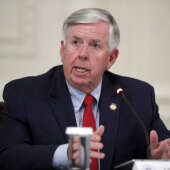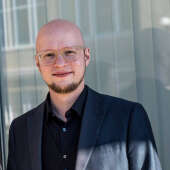Mike Van De Ven

Southwest Airlines chief operating officer talks business at Codefi
Mike Van De Ven, Cape Girardeau native and chief operating officer for Southwest Airlines, is “Cape’s best-kept secret.”
That’s how Glen Campbell, co-founder of LIDS, introduced Van De Ven on March 8 at Codefi’s Fireside Chat in downtown Cape Girardeau.
The event, which Campbell emceed, is part of a speaker series that hosts business leaders, entrepreneurs, and technology enthusiasts at Codefi, giving the Codefi community opportunities to converse with leaders involved in diverse business pursuits.
Van De Ven, who has been with Southwest Airlines for 25 years and now resides in Texas, focused his chat on the growth of the airline over the past four decades, as well as the company’s vision for success.
In 48 years, Southwest Airlines has grown from a fleet of three airplanes with flights between Dallas, Houston and San Antonio, to become the second largest carrier in the world in terms of passengers carried. They currently fly to 100 cities with a fleet that is 706 airplanes strong, employ over 52,000 people and take in more than 20 billion dollars in revenue yearly.
Their strategy? Scour the marketplace to find where they can stimulate travel, then drop the fares by 25 to 40 percent in those areas. This, not to steal business from other carriers, but to generate traffic in the marketplace from people who might not otherwise fly. Add in employees who care about customers in order to keep fliers coming back, and you have the Southwest Airlines formula for success.
In four words: low fares, good service.
It’s their culture. Southwest Airlines’ mission is to connect people to the important things in their lives. They do this through staying focused on the people — both their customers and employees.
One way that Southwest Airlines focuses on their customers is by remaining the only airline that doesn’t charge baggage fees.
This was “one of the more courageous decisions a CEO could make,” Van De Ven says of Southwest Airlines’ former CEO Herb Kelleher’s decision to remain committed to Southwest’s complimentary baggage policy. This was a bold move at the time because Southwest Airlines’ margins were not as high as their competitors’.
“We soul searched — is that the way we want to be with our customers?” Van De Ven says of the option to charge for bags. “We concluded that no, we didn’t want to go do that.”
Southwest continues to see this decision as revenue-positive, earning more customers who pay a full fare to their airline than the revenue they would make from baggage fees.
Southwest Airlines also looks to their employees on the frontlines who “have servants’ hearts, fun-loving attitudes and warriors’ spirits” for input on how to solve problems.
“We want to be able to outsmart, outserve and outhustle the competition,” Van De Ven says of why Southwest Airlines asks their employees to help streamline processes. The people who do the jobs every day, such as walking between the truck and cockpit to stock food, have the ideas about how to make processes better, Van De Ven says.
This gives Southwest Airlines’ employees a sense of purpose in their work.
“Our employees feel energized with what they’re doing,” he says. “I hear people say all the time, your company’s so big, you’re going to lose your culture. I tell people it’s exactly the opposite. The culture is so big and powerful at Southwest Airlines, if we really believe in it, it’s not going to allow itself to change. It’s going to spit people out that don’t fit our mold.”
To help create this culture, the company sends birthday, anniversary and graduation cards to their employees and employees’ family members.
“We are a family,” Van De Ven says. “We spend a lot of money and a lot of effort trying to make sure we keep that intact.”
These values resonated with many Codefi community members in attendance at the chat, who attested to the above-average service they have received while flying on Southwest Airlines.
“Service is always going to be important,” Campbell says of Southwest Airlines. “Being good to people and treating people fairly will never go away, and that’s why they’re successful.”






























